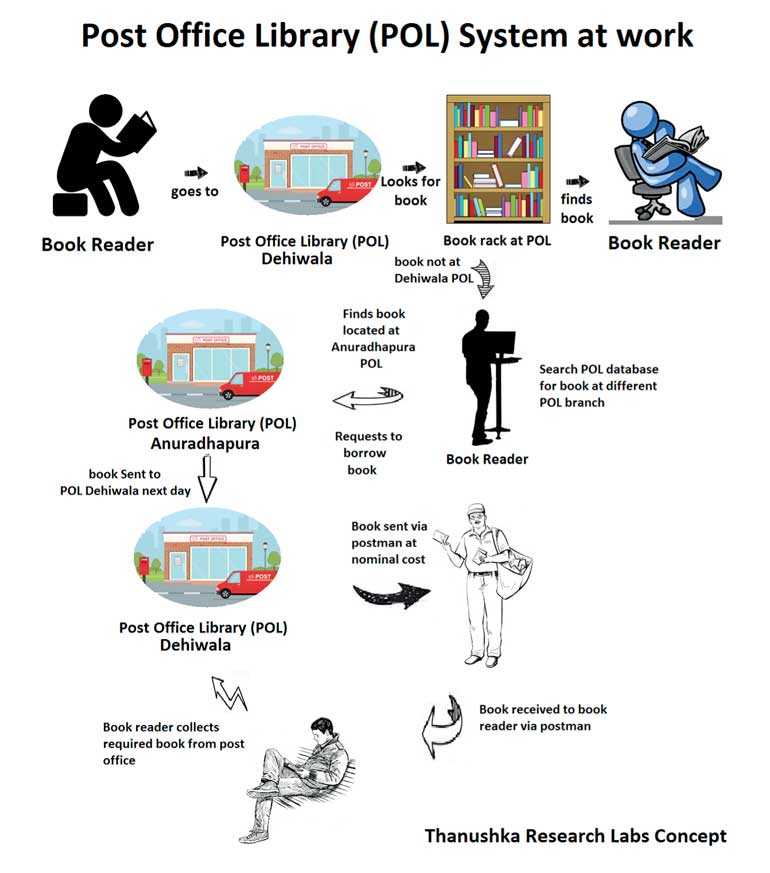Thursday Feb 19, 2026
Thursday Feb 19, 2026
Friday, 15 November 2019 00:00 - - {{hitsCtrl.values.hits}}

By W.G.T. Fernando
“Reading maketh a full man” – Francis Bacon
A library is by tradition, a place which houses books which are accessible by public to read and borrow. It is however sadly a place which is least visited by the public. Make a visit to any public library near your area and you will observe how vacant the vast place is. Most books are untouched for eons. Maintenance is ignored, the few staff that are employed keep themselves occupied by doing other things or not even being present for work since there is hardly any work to be done. 
Why is this establishment not actively encouraged to be used by the general public? Is it not a place of knowledge? Is it because there is no tuition master at the end of the hall trying to explain the contents of the books? Is it because the library does not house books which help to pass the standardised tests that are forced on students? Is it because the general public is unaware of the treasure of knowledge that is hidden in the library?
Somehow, however, it seems we are not asking the right questions or keeping questions open-ended. Maybe what is needed to solve is not why the general public don’t visit this isolated establishment but where we can place this ‘library’ amidst a place where the public do actually have a good footprint. A post office seems like the best location (after a public school) in order to house this ‘library’ it seems.
The 4,700+ post offices that are established around the island are places where the public come not only to post letters and packages. They also use services such as paying traffic fines, getting the pension, money transfers, insurance, electricity, telecom bill payments and many more.
With a vast space allocated for most of the post offices around the island, it is a viable proposition to better manage the prime estate space and create space to house bookracks for a makeshift library which we refer to as ‘Post Office Library’ or ‘PO Library’ or ‘POL’ for short.
The PO Library would not need additional staff to maintain it either. An existing staff member who is in charge of a less demanded task could maintain and accommodate the POL initially. Overtime, once POL attracts more of the public, dedicated staff could be assigned.
What can POL do for the general public?
Since the post office would house the books, it also allows the system to make a certain book accessible nationally. Once an efficient website with a catalogue of the books present at each post office is created, a person from Medawachchiya, Anuradhapura could request to borrow a book that is located in a post office in Tissamaharama, Hambantota. How is this possible you may ask? This would be through the post office service itself with a little help from the State by allowing books be posted nationally without any cost. This way, the books at each post office could be transported to any other post office as requested by the public. The person who requested the book would then get an sms alert informing him/her to collect from the nearest post office.
POL can also be used as a location for new authors to have reading sessions targeting their readers, a place for children to enjoy some reading time, a space to promote new books by publishers (revenue earning mechanism for the post office which could in turn use that money to buy new books).
If we do not have creative action plans to encourage our youth into reading for pleasure, we will have a very troublesome future generation who have only been encouraged to read to pass exams. POL could be the answer that the State had been looking for with the bare minimum implementation procedure.
(The writer is an author of 25+ ICT books and founder of GTS, an educational game production company. He is currently reading for his PhD at General Sir John Kotelawala Defence University focusing on the thesis area of ‘creating a new education paradigm for Sri Lankan primary education system’. He can be contacted via [email protected].)